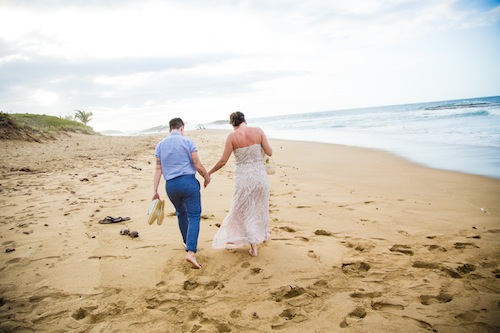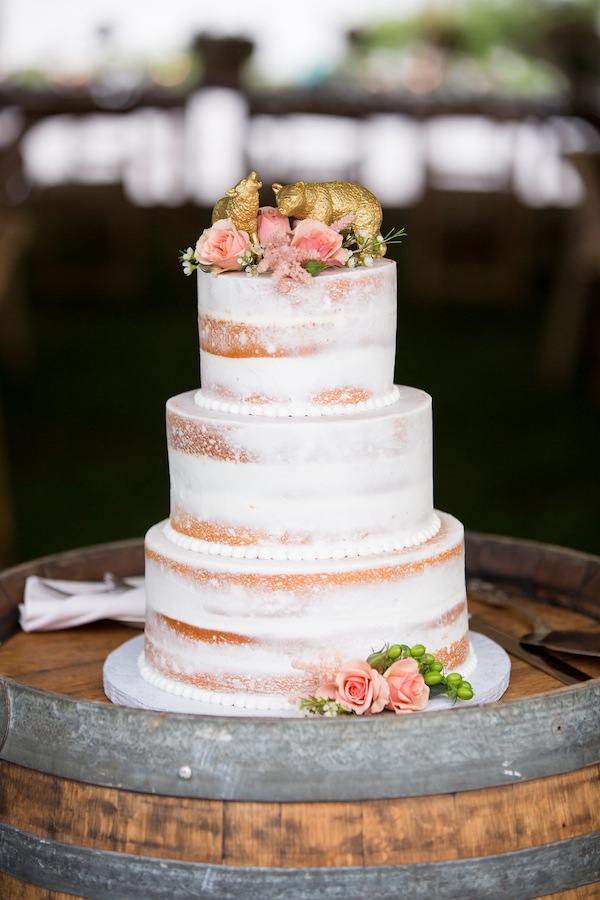
Photo by Derek Chad Photography
You’re a crafty person. You DIY’d before there was a tv channel, a YouTube and a whole broadband’s worth of blogs dedicated to it. It doesn’t matter if it ran in the family or if you had to pick those sweet sewing skills up out of necessity; where other people saw three rusted bolts and a discarded doily you saw opportunity. And what sort of opportunity does your wedding present?
One riddled with booby traps at many wedding DIY opportunities. The prospect of having a completely DIY’d wedding seems fun at first. But if you’re not careful, you’ll find yourself crying mere moments before the big walk because you misspelled your new last name on 37 hand-personalized serving spoons and literally no one noticed until that very moment. It’s a lot of pressure, takes a lot of time and it’s not always the best way to save money.
It doesn’t have to be this way. We rang up our good friend and primo wedding planner Sarah Petersen of Sincerely Pete Events to guide us through this strange and terrifying world of DIY weddings. Her key pieces of advice?
1. Let’s be realistic.
I’ll admit it: when it comes to personal projects, I tend to over-scope. Well, that’s not quite accurate—really, I drown myself in an ocean of “To-Do” lists and double-over-triple-rebooked semi-meetings-sort-of-work session. I obviously get a lot done and am super, super productive. Obviously.
But my coveted method of getting stuff done might lose some of its effect when applied to a wedding. It’s best to just come clean with yourself from the beginning about your talents, your funds and how much time you actually have to put towards this.
“Every DIY project needs to be put into perspective. Is the money saved going to be worth the stress and time it will take to accomplish?” Petersen advised. “ Every task will take longer than expected! First rule of advice when it comes to DIY is to ‘Know Thyself!’ If you are not a crafty person, don’t attempt arts and crafts. If you don’t have good handwriting, don’t write your addresses by hand on your invites.”
Ignore your ego completely because they’ll only lead you to harm. Seems easy enough.
2. Focus on what actually matters
“Also, make a list of what is most important to each member of the couple and what you each find value in,” Petersen continued.
“I have several couples who just don’t find value in flowers. They want a beautiful atmosphere, but flowers just aren’t for them. That’s totally OK. Candles and other decorative elements like glass can be used for centerpieces. Because these items can be reused in the couple’s home or sold following the wedding, these items can be seen as having a return on investment.”
You may think that a fully traditional wedding complete with all the trimmings is exactly what you need to assure that your new life will be greeted with nothing but good vibes and money, but you’re probably wrong. Not all couples are into flowers, and some don’t even need a cake. Sit down with your honey and discuss what absolutely, positively need and what you wouldn’t mind letting slip by the wayside. Figuring that out from the beginning can help you decide where to best allocate your time and money, before the crunch does it for you.

Photo by Derek Chad Photography
3. Know how to handle the crew
So, Grandma’s friend Beth just loves to cook and would love, love, loooove to feed you and all 200 of your little friends. Bless her heart and her minor arthritis. As much as you love Beth, it might be time to let her know she simply isn’t about this life. Friends and family who are eager to help are angels (of destruction). Things get surprisingly personal surprisingly fast, and while they may offer to work for free, between you and me nothing in this life is actually free. Unless this is how they bring home the bread and butter (in which case, don’t think you can get out of paying them for their hard work—don’t be that friend.), drop the icing and step away from the serving tray.
“If someone you know, are friends with or is family, offers to ‘help’ with the wedding and you do not want that help, the best excuse is ‘I don’t want anyone I love and care about having to work for my wedding,’” said Petersen. “Second best, ‘My fiancé and I already have a plan for XYZ’ or ‘My fiancé and I already have a vendor in mind. If it doesn’t work out, I’ll let you know.’”
3. Put down the curling iron.
Watching four back-to-back videos of Kim K applying her contour doesn’t make you a makeup artist (I mean she’s not one either). But you can—and should—try to get a beauty team as on-point as hers.
“There’s a lot of pressure to look your best on your wedding day, and there are a lot of people who actually don’t do their makeup daily,” said Petersen.
“It’s important to consider that makeup photographs differently than what it looks like in the mirror as well. Hair and makeup can take up a ton of extra time. A professional helps you stay on schedule and looking your best.”
5. Set some due dates
Looking at all those optimistic procrastinators out there. This isn’t college; the late night trips to Starbucks won’t help you this time. If you plan to undergo a large-scale project (we recommend invites and personal party favors if you’ve really got the itch) go in with a game plan and understand that it is your lifeboat. And you know what happens when you stray from a lifeboat, right?
(Hint: you drown.)
“There is nothing wrong with getting things done too soon!” Petersen told GayWeddings. “All projects should be done a month before they will be used. For example: invites should be printed and ready 30 days prior to the date you want to ship and ceremony programs printed 30 days before the wedding, etc.
“This allows the time if something has to be redone, takes longer than expected or if something comes up and there are delays.”
6. TL;DR? Don’t do anything you’ll have to worry about day of.
Just don’t. You’ll feel terrible on your own wedding day, which will just undercut all of your hard work.
Do you plan to DIY anything for your big day? Tell us all about in on Facebook or Instagram!






